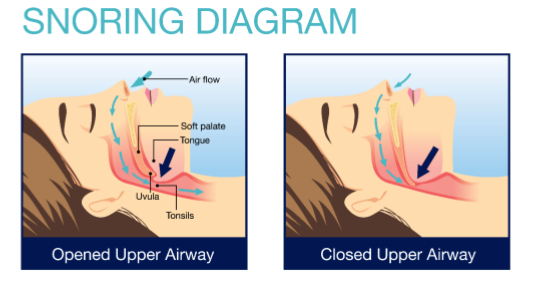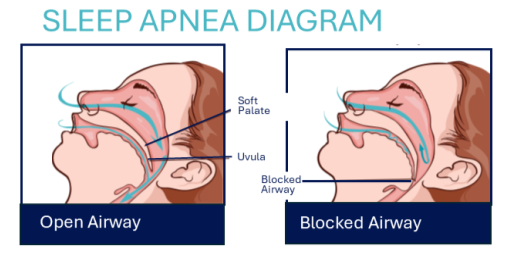
As Long as You're Up...Let's Look at Snoring in a Different Way
Snoring. It can upset your sleep and your partner. Even worse, once you know that you snore, you can’t un-know it, and that is uncomfortable on so many levels.
But suppose we look at snoring differently. First, some snoring is good for you (even if not for your partner). Second, finding out that you snore can be a life-changing opportunity! With a little investigation and experimentation, finding out that you snore can make you happier, healthier, and more productive (maybe even nicer)!
What Happens When We Snore?
Snoring happens when the flow of air through your nose and mouth is partially blocked while you’re asleep. The air you breathe is trying to get through a fairly narrow passage. If all goes well, the air travels through the passage and into your lungs. If the passage is too narrow, your uvula (the thing you can see hanging down in the back of your throat) and other soft tissues partially block the flow of air. The air makes the tissue vibrate and that makes the sound that we know as snoring.

Several situations can create a narrow or obstructed pathway in your throat.
- Relaxed Muscles: During sleep, the muscles in your throat relax, which can cause the tissues in your throat to partially collapse. This is why you are more likely to snore as you age when all your muscles get weaker. It is also why you snore more after drinking alcohol, which relaxes your muscles.
- Narrowed Airway: If your airway is naturally narrow or if you are congested from allergies or a cold, it can make it harder for air to pass through freely. This is also why you are likely to snore more if you gain weight. Your neck gets thicker and more likely to block the pathway.
- Sleeping Position: Sleeping on your back can sometimes make snoring worse because it can cause your tongue and soft palate to fall back and block your throat.
So, What Could Be Good About Snoring?
We have written several times about how critical sleep is to our health, well-being, and productivity (links below, if you want to catch up). We know that regularly getting fewer than seven hours of sleep per night raises our risk for cancer, depression, diabetes, heart attacks, obesity, and strokes. Then there are the increased risks of falls and accidents related to fatigue. If your already too little time in bed includes regular snoring, it is quite likely that you are more sleep-deprived than you think. And let’s not even discuss the risks you are sharing with anyone who is having a difficult time sleeping next to you.
The good news is that if you snore, you’re likely just a few simple steps away from significantly improving your mental and physical well-being. Identifying the cause(s) and patterns of your snoring and experimenting with some lifestyle adjustments can make an extraordinary difference in the ways you look, feel, and work every day. Understanding and beating a snoring problem will increase your lifespan and may breathe new life into your relationships.
Snoring and Sleep Apnea
People who snore and are experiencing fatigue are often prescribed a sleep study to determine if they have obstructive sleep apnea. But, contrary to popular belief, snoring and sleep apnea are not inextricably linked. According to a recent study, snoring is a very weak indicator of sleep apnea, but 94% of those who have obstructive sleep apnea do snore. As you can see by the diagram below, obstructive sleep apnea also involves blocked airways. In snorers, blocked airways create a noise. In obstructive sleep apnea, the blocked air flow will actually wake the sleeper up in order to catch a breath. There is another much less common form of sleep apnea, central sleep apnea, which doesn’t have anything to do with blocked airways and not much to do with snoring, and we will not be addressed here.

We mention sleep apnea because both obstructive sleep apnea and snoring, whether they occur separately or together, can quite often be reversed with lifestyle changes, even without getting a specific diagnosis. All it takes is a little trial and error and some dedication.
Short-term Adjustments
Here are some instant adjustments you can try to see if they stop the snoring.
- Change your sleeping position. Sleeping on your back is more likely to obstruct your airway thanks, basically, to gravity. While it is hard to will yourself to sleep on your side, you can set up your pillows to prevent you from rolling onto your back.
- Do not drink alcohol before bed. Although alcohol may make you feel drowsy, there are several ways that alcohol affects the quality of your sleep. It can cause snoring by relaxing the muscles in the back of your throat too much. Sedatives can have the same effect. If you are used to taking a sedative or drinking alcohol at night, you might want to try a night or two without to see if there is an improvement in your snoring.
- Elevate your head. If your snoring is caused by congestion and/or gravity, sleeping with your head higher can make a huge difference. Also, make sure you treat your congestion right before bed.
Longer-term Adjustments
The best steps you can take to stop snoring and get more restful sleep involve the usual suspects: diet and exercise. Weight loss and a stronger body are powerful tools that can reverse both snoring and obstructive sleep apnea. If you needed more motivation to adopt some healthy habits, consider the fact that along with the obvious benefits of eating healthier food and moving more, you will also be getting all the benefits of better sleep. And those are compelling! You’ll have more energy. Your mood will be better. You’ll lower your risk of serious disease, and you’ll be less likely to fall asleep at inopportune times, like while driving or at work.
How To Know if You Need Medical Help
According to Greg Jennings, Nurse Practitioner, and manager of the Chronic Care team at Amaze, “Snoring happens to most people, but if there is accompanying daytime fatigue, where someone may need an afternoon nap to function, or falls asleep at their desk or while at a stoplight, that is concerning.”
When a patient complains of snoring, or says “my significant other says I snore”, Greg’s first question is: “Do they notice you stop breathing? Or do you wake yourself up from not breathing?” A medical provider can help you deconstruct your symptoms, separate the usual from the unusual, and decide on next steps.
Greg advises that a good first step is to gather your own data with a device or app that monitors sleep. There are several that will actually record your instances of snoring, which is better than checking with a partner. He agrees that weight loss and increased exercise can go a long way towards resolving both snoring and obstructive sleep apnea.
The Bottom Line on Snoring
There is no question that snoring can be annoying to those around you, can hinder your sleep quality, and can be a sign of a more serious underlying health condition. But for many of us, addressing a snoring problem can be a unique opportunity to create broad positive change in our lives. Don’t be afraid to experiment with lifestyle changes to see what works for you. Until you see real results, if you sleep with a partner, invest in ear plugs and/or a white/green/pink, etc. noise machine. It will make for a much happier journey towards better health.